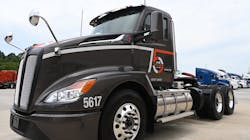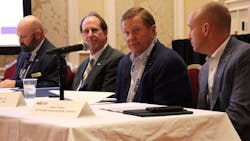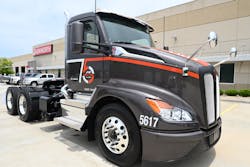Reason to celebrate: Sumerford reflects on J&M’s 75th anniversary
J&M Tank Lines CEO Harold Sumerford Jr. has plenty of reason to celebrate. His company recently collected the Georgia Motor Trucking Association’s President’s Safety Award as the state’s safest fleet, placed first in the Alabama Trucking Association’s tank truck division, and opened a new terminal in Little Rock, Arkansas.
Oh yeah, and J&M is marking 75 years as a family-owned bulk hauler in 2023.
Jimmie McClinton founded J&M in 1948 in Selma, Alabama, with a $125 loan. Harold’s father, Harold Sumerford Sr., joined the company in 1961, and assumed sole ownership of J&M after McClinton’s death in 1981; and the younger Harold, who joined J&M in 1978—followed by brother Peter Sumerford, J&M president, in 1989—rose to CEO in 2002. The carrier, now headquartered in Birmingham, Alabama, today boasts 11 terminals, including sister company TransChem USA, and a growing fleet of 480 trucks and 880 tank trailers.
But the immediate past American Trucking Associations chairman, and former National Tank Truck Carriers and GMTA chair, is too busy securing his company’s future to waste time reflecting on the past. Fortunately, Bulk Transporter was able to catch up with the tireless 62-year-old after NTTC’s 2023 Annual Conference to talk about the milestone anniversary, as well as the impact of Covid-19, how the tank truck industry’s trade association is doing, and his plan to set up J&M for another 75 years.
Questions and answers are edited for length and clarity.
Bulk Transporter: The last few years have been challenging, from the Covid slowdown to soaring inflation, and now a “rolling recession.” How has J&M fared, and how is the company doing in its 75th year of operation?
Harold Sumerford Jr.: “We never really slowed down during Covid, and the last two years, financially, have been the best we’ve had in probably the last eight, as far as profitability and growth. So we’re excited. We’ve had challenges like everybody else, with hiring drivers, but that’s not much of a problem right now, and business has fallen off a little bit but not substantially. We recently took delivery of new equipment, we’ve got more on order … and we’re still looking to grow organically, as well as through any acquisitions we can make.”
BT: Where have you seen the most growth in recent years?
HS: “The hottest segment the last two years was our chemical side, but we’ve seen the biggest slowdown there, and on the dry bulk side, business has come back this year. We’ve struggled like a lot of people, but we have been able to add revenue. And we expect the terminal we’re opening now to be a good size terminal that continues to help us grow. So we’re doing a lot geographically, by moving into different markets.”
BT: How will the new terminal in Little Rock contribute to J&M’s growth?
HS: “It allows us to look at new business. We’re in that geographical area now, and we’re going to start marketing it heavier to help it grow, and that could come from food-grade products, to dry bulk products, or any kind of chemicals. We’re there to grow, so I’d be disappointed if we’re not at somewhere around 70 trucks there within the next 18 months.”
BT: What has kept J&M in business for more than seven decades?
HS: “It goes back to the biggest thing I always say, which is if you treat people like you want to be treated, the rest of it will take care of itself, and that’s basically what we’ve done over the years. We’ve treated customers, and J&M team members, the way we want to be treated, and generally it has worked out. You might have a hiccup from time to time, but if you go back and look at it, maybe there were bad expectations on somebody’s side, and that’s why it didn’t work out. So I just attribute it to doing the right things, and if it’s too good to be true, it probably is.”
BT: Where are you focusing your time and energy today?
HS: “One of my main responsibilities is making sure J&M is prepared for the future, so that’s something we’ve been looking very hard at. Where are we headed? It doesn’t matter what anybody says, I do believe we’re in a trucking recession, especially if you look at other modes of the industry, so I’m making sure we’re prepared for that, or a potential slowdown; or if our economy ends up stalling out, making sure we’re poised to take advantage of it, which we have in the past. We’ve grown during every recession we’ve been through since the early 2000s, and then been able to sustain it as we go down the road. It’s important to be able to do that and position ourselves for the good times, so that’s really what’s been keeping me busy, trying to stay out in front of everything at out terminals, and just listening and seeing what’s going on.”
BT: You’ve been heavily involved with several industry associations over the years, especially NTTC, which hit a rough patch in 2020. Are you happy with the progress NTTC has made turning things around since the pandemic?
HS: “The association’s in great shape. We have great leadership at the staff level, as well as with the officers. Ryan [Streblow] and Moira [Smith] are doing a great job, and so is [lobbyist] Britton Mullen. I know she’s not on the staff but she’s part of the team. She does a great job for us. So NTTC is in the best shape it’s ever been, as far as I’m concerned, and they’re providing value to the membership. I believe the branding effort is really going to go over well, as far as getting our message out to the public, so they understand pulling a tanker is a great job for drivers—and working with tanker companies is a great occupation.”
BT: Where do you see yourself in five to seven years?
HS: “I tell people all the time, this is what I love. I don’t feel like I’ve worked a day in my life. I go to the office or somewhere else, but I enjoy what I’m doing. I don’t consider it work. So, as long as I’m healthy, I plan on staying involved. We are doing a good job, and at the same time, we’ve got a great group of young people coming up in the company, so that’s part of my job as well—supporting their advancement through the ranks, and making sure we stay modern, and equipped for the future.”
BT: Will J&M still be family-owned and -operated in 2098?
HS: “It probably won’t be family operated. We have a nepotism rule at J&M, so it may be family owned and not family operated, but that depends on the job we do with our current staff over the next five years, bringing them up, educating them on how to run the company, and teaching them the ropes. But at some point, J&M probably will be run by a non-family member. That’s the objective right now, so we’ll see what we can do with it.”
About the Author
Jason McDaniel
Jason McDaniel, based in the Houston TX area, has more than 20 years of experience as an award-winning journalist. He spent 15 writing and editing for daily newspapers, including the Houston Chronicle, and began covering the commercial vehicle industry in 2018. He was named editor of Bulk Transporter and Refrigerated Transporter magazines in July 2020.




